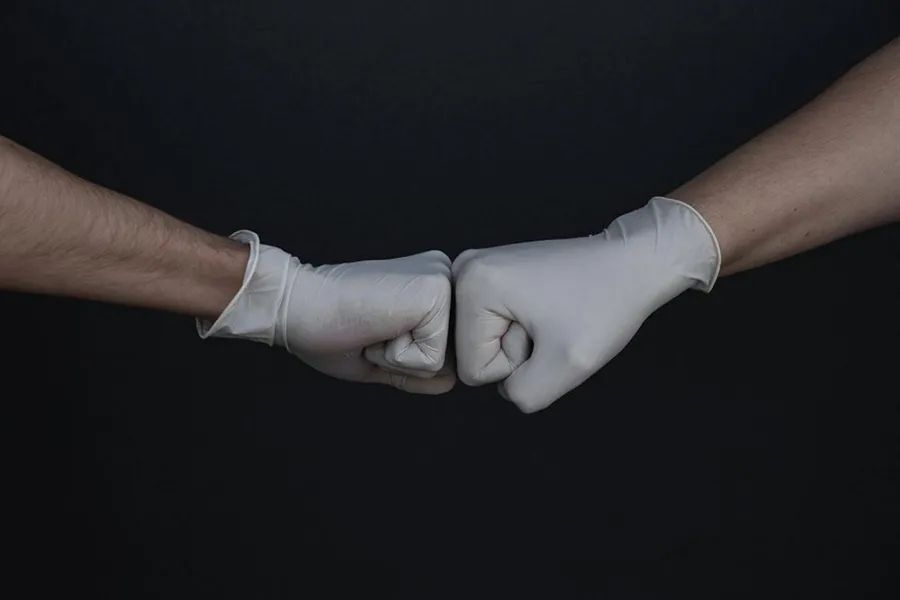Front-Line Workers Shield Washingtonians With Disabilities From COVID-19

As COVID-19 sweeps across our state and nation, public employees at Washington’s institutions for individuals with disabilities are doing everything they can to keep their residents safe.
Andrea Warren, WFSE Local 573 President and an Attendant Counselor, has been working at Lakeland Village in Medical Lake for 26 years. So far, no one at the 24-hour facility has tested positive for the novel coronavirus, and Warren and her coworkers are working very hard to prevent its spread.
“There’s no such thing as social distancing,” Warren said of her duties.
She provides a wide range of assistance, including meal preparation, feeding, bathing and grooming.
“Even when we’re not providing hands-on care, we’re providing that emotional support,” she said. “And these days, most of us need that ourselves.”
COVID-19 hasn’t changed Warren’s passion for her work, but it’s placed considerable strain on both staff and residents at Lakeland Village.
“Programs are closed and residents with jobs can’t go to work as usual. It’s more intense,” she said. “Because of social distancing, other programs can’t provide their usual offerings. That means we are the end-all and be-all to our residents more than ever.”
Licensed Practical Nurse Carol Denison has been working at Rainier School, a sister residential home in Buckley, for six years. Like Lakeland Village residents, all clients there are sheltering in place.
“We are suiting up and showing up,” she said. “Our efforts here to prevent the spread of COVID-19 are a shining example of our commitment as public service workers.”
Denison is determined to keep the folks she cares for safe. Right now, that means twice daily monitoring of resident temperatures.
“I am the house nurse for my cottage,” she said. “I have 13 fairly elderly and medically fragile clients. If one of my clients even wheezes or develops a cough, I will jump right on it.”
“It’s all about protecting my clients and my coworkers.”
Denison and her coworkers have stopped eating lunch together and have moved their desks six feet apart. Rainier School administrators have also set an occupancy limit on offices, and are staggering shifts to help maintain physical distancing.
Thermometer covers are running low, but management has informed staff that everyone in direct contact with clients will soon be provided masks and required to wear them.
So far, no one at Rainier School has tested positive for COVID-19, though three staff have been sent home this week after reporting temperatures. A daily staff questionnaire asks whether workers have been exposed to COVID-19 since last reporting for work and if they’ve had a fever.
If COVID-19 does come to Rainier, a plan is in place. Staff will help clients isolate in their rooms, place a COVID kit outside each door for cleaning and sanitizing, and require clients to wear masks when outside their rooms. It’s challenging for some with developmental disabilities to understand and tolerate wearing masks, but staff are ready to support them.
Denison misses seeing her son and her pregnant daughter, a public school teacher, but focusing on public service and the folks she cares for gives a sense of purpose.
“It’s a privilege and honor to care for these people,” she said.
At Lakeland Village, administrators took the threat of COVID-19 seriously right away.
“I’m very proud of the people who work at Lakeland and the administration,” Warren said. “We have been on top of everything.”
She says protective measures include plastic face shields, face masks, gowns, gloves, and careful rationing of supplies like sanitizing wipes. While Lakeland staff haven’t been able to get N95 masks, she says that’s due to national shortages, not neglect by administrators.
Warren insists that not just the nursing staff, but also the lowest-paid workers who keep the kitchens running, the cottages clean, and the laundry clean deserve courageous duty pay.
“Housekeepers disinfect our cottages and do deep cleaning,” she said. “Our kitchen staff, they feed us. If they weren’t doing their jobs, ours would be so much more difficult.”
“It’s really important to me to be able to serve our residents to the best of our ability. We want to keep our residents safe. And I’d like to keep the community safe.”
Carol Denison has signed up for volunteer medical mobilizations in Thurston and Pierce counties.
“If they have to borrow nurses...,” she says. She stops mid-sentence, and says she hopes it doesn’t come to that.
“We need to keep our heads together and wash our hands,” she says. “Public service is critical for our community.”
